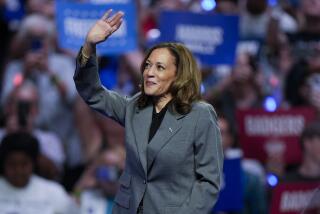Peres, Rival Get Homestretch Endorsements
JERUSALEM — As Israel’s hotly contested election campaign neared its conclusion Monday, Labor candidate Shimon Peres and Likud hopeful Benjamin Netanyahu won endorsements from different segments of the electorate that each hopes will provide the crucial margin of victory.
Netanyahu, the challenger in the prime minister’s race, energized by what supporters regard as his victory in the campaign’s only one-on-one debate Sunday, got a boost when ultra-Orthodox religious leaders backed him. For Netanyahu, support from the country’s estimated 250,000 ultra-Orthodox Jewish voters is vital if he is to defeat the incumbent.
For Peres, a larger-than-normal turnout by the country’s 280,000 Arab voters has always been a key to election. On Monday, a Labor campaign official said there were fresh indications that Israeli Arabs will turn out in large numbers to support Peres, despite their lingering anger over Israel’s military campaign in Lebanon last month and the closure of the West Bank and Gaza Strip following a wave of suicide bombings in February and March.
Both parties regard the choice Wednesday as perhaps the most important for Israel since its founding almost five decades ago. The next prime minister will be expected to lead the country through the final phase of peace talks with Israel’s Arab foes--discussions that will decide the country’s boundaries, whether to permit the creation of a Palestinian state and the future of Jerusalem.
With Israelis seemingly split down the middle about their future, the outcome may well be decided in the crowded Arab lanes of Jaffa or in the ultra-Orthodox Jewish neighborhoods of Jerusalem. Another question mark for observers is which way the country’s 650,000 immigrants from the former Soviet Union will tilt.
By law, broadcast advertisements for the candidates ended Monday night.
Tourism Minister Uzi Baram, in charge of getting out the Arab vote for Labor, said in a telephone interview Monday that a new survey conducted by his party indicated at least a 75% turnout among Arab voters, a significant increase over the 68% who voted for parliament last time in 1992. Of these, he said, more than 90% will vote for Peres.
“We had a lot of problems two or three weeks ago, but we overcame,” Baram said. Israel’s Arab electorate was “disappointed” in Peres because of the Lebanese operations, including the April 18 bombing of a U.N. camp at Qana in which about 100 civilians were killed. But he said Israeli Arabs are more frightened by the prospect of bringing the tough-talking Likud to power.
Abdul Wahab Darawshe, leader of the Arab Democratic Party, on Sunday called on Arabs to vote for Peres. Other Arab parties in Israel stopped short of endorsing Peres by name but urged a vote for the candidate most sympathetic to the peace process.
Elie Rekhess, a Tel Aviv University expert on Arab politics in Israel, said he is still unconvinced that Arabs will turn out in the numbers Peres needs. “I don’t think anyone can tell today whether the grass-roots voters will adhere to what the leaders say,” he said.
Meanwhile, Rabbi Eliezer Schach, centenarian spiritual leader for many of Israel’s ultra-Orthodox Jews, told the Degel Hatorah religious party to announce his specific instruction to vote for Netanyahu, newspapers reported Monday. Another religious party, Agudat Yisrael, gave somewhat less clear instructions: It said members should vote for the candidate “whose party is closer to acting in favor of religion.”
“This means that most ultra-religious Jews who were still undecided will now go with Netanyahu,” commented Dov Elboum, who writes on religion for Yediot Aharonot, Israel’s largest newspaper.
But Ephraim Sneh, Labor’s health minister, said Agudat Yisrael’s vagueness will benefit Peres. “We don’t think Likud has any monopoly on loyalty to Israeli traditions and religion,” he said. “It will make some difference, but I can’t quantify it.”
As the endorsements became known, a brouhaha developed because of placards posted along the highway from Tel Aviv to Jerusalem saying in Hebrew, “Only Netanyahu Is Good for the Jews.”
Likud quickly disassociated itself from the posters, saying Likud is good for Arabs as well as Jews. Peres called the placards “terrible.”
“They want to divide the people,” he said. The posters were thought to be the work of a Hasidic group known as Chabad.
More to Read
Sign up for Essential California
The most important California stories and recommendations in your inbox every morning.
You may occasionally receive promotional content from the Los Angeles Times.










